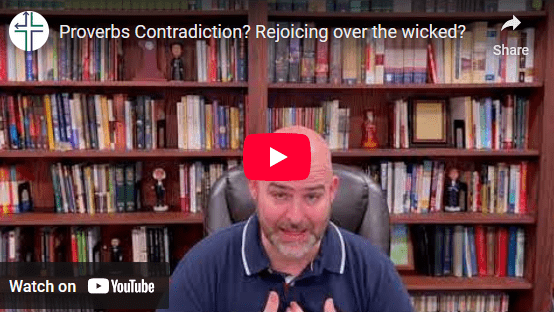Auto-generated Transcript:
Our question today comes from examining two different proverbs. These proverbs, on face value, may appear to be contradictory—but we know they’re not, because God’s word is not in contradiction. It is truth and without error.
The two proverbs are this: Proverbs 24:17 says, “Do not rejoice when your enemy falls, and let not your heart be glad when he stumbles.” And the second is Proverbs 11:10, “When it goes well with the righteous, the city rejoices, and when the wicked perish, there are shouts of gladness.”
So which is it? The first proverb seems to indicate that we are not to rejoice when our enemy falls and not to be glad when they perish. But the second says the righteous in the city rejoice when the wicked perish, and there are shouts of gladness. This seems like two different messages. However, they are not.
We need to examine the context of each proverb to properly interpret what’s happening here. The first passage is saying not to rejoice individually over the death or the perishing of the wicked. Why? Because that’s not healthy for us. It only leads to bitterness, resentment, and revenge. It puts us in the place of God, and God knows we won’t handle that correctly. More than that, it doesn’t reflect the heart of God. God Himself does not rejoice in the death of the wicked—so why should we?
This is what God tells Ezekiel in Ezekiel 33:11: “As I live,” declares the Lord, “I have no pleasure in the death of the wicked.” Why? Because He wants them to turn back. He wants them to repent. So God does not want us to rejoice when our wicked enemies fall. He wants us to pray for their repentance. This first proverb is on an individual level and has a specific command—it is prescriptive, telling us what not to do.
The second proverb is different. It is not prescriptive and not individual. Let’s read it again from Proverbs 11: “When it goes well with the righteous, the city rejoices, and when the wicked perish, there are shouts of gladness.” Notice that the context here is corporate—it’s written to a city, not individuals. It is descriptive, not prescribing what should happen, but describing what does happen when the wicked fall.
It’s telling us the result of the righteous ruling versus the wicked ruling. When the righteous rule, there are blessings. When the wicked rule, there are consequences. It doesn’t go well for the righteous under wicked rulers, and there’s little joy in the city. But when the wicked are removed and the righteous rule, it goes well for everyone, and the city rejoices. This is not about personal bitterness or vengeance—it’s describing the blessing that comes from righteousness in leadership.
Proverbs 14:34 says, “Righteousness exalts a nation, but sin is a reproach to any people.” Another similar verse is Proverbs 29:2: “When the righteous increase, the people rejoice; but when the wicked rule, the people groan.” When the wicked are removed from power, it brings peace and joy to a city because of the blessings that come from obeying God.
So, the first proverb is prescriptive—what we ought not to do on an individual level. The second is descriptive—what happens in a community when the righteous lead and the wicked are removed. It’s not about celebrating someone’s death but acknowledging the blessing that follows righteous rule.
And this has been Five Good Minutes.

